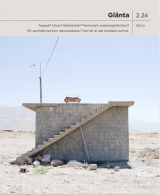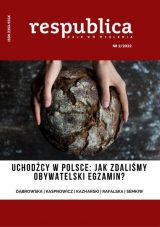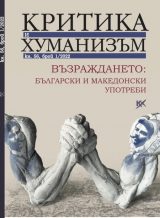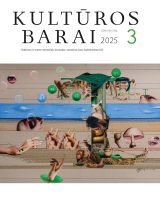Ivaylo Ditchev
(1955–2023) Professor of Cultural Anthropology at the St. Kliment Ohridsky University in Sofia. His most recent book was Culture as Distance: Eleven Essays in Cutural Anthropology (Sofia 2016).
Articles

Cultures of mobility
From controlling to democratizing borders
Mass migration is not merely the result of geopolitical and economic factors, but of cultural triggers too. Moreover, says Ivaylo Ditchev, borders themselves must be subject to a public debate about what kind of borders we want where, rather than arbitrary decisions made by the powers that be.
Democracy live
Media, politics and the tyranny of the opinion poll
The crisis of the euro indicates not only a threat to European integration, but also a crisis of European democracy characterized by a surge in “anti-politics”. Many analysts have identified the media as the single most important factor in this development, as the marketization of the media combines with digital technology to create a political order determined by public opinion. In political decision-making, the question whether this opinion is right or wrong becomes secondary to its value as a form of feedback. British journalist Judith Vidal-Hall met Bulgarian cultural anthropologist Ivaylo Ditchev in Sofia to discuss what this means for citizens’ trust in the political system and for democracy as such. Moderated by Carl Henrik Fredriksson, editor-in-chief of Eurozine.
Territory, identity, transformation: A Baltic-Balkan comparison
A Baltic-Balkan comparison
Lithuania and Bulgaria: two nations on the peripheries of central Europe, both bearing strong traces of former Empires. Subjected to neoliberal forces of disintegration, historical identities re-pattern along new lines of conflict, the politics of ’89 now redundant in the regulated zone of market democracy that is new Europe. Ivaylo Ditchev and Tomas Kavaliauskas share Baltic-Balkan perspectives on the present.
Approaches to migration often fall into one of two camps: anti-neoliberal hostility or euphoria at “flows”. Yet the “new mobility” implies new freedoms as well as new privations. Researching the biographies of Bulgarian migrants, Ivaylo Ditchev finds that the horizon of departure has become a basic dimension of the world. Mobility, he writes, will need to be taken more seriously in the anthropology of citizenship.
The utopia underlying the idea that increased freedom of movement will homogenize the EU is proved wrong by the observation that more frequent crossing of borders creates more difference rather than less. Be it as labour migration, higher education exchange, or tourism, the mobility brought by European enlargement by no means eliminates the role of national borders as identity resources.
After almost half a century of socialist state policy replacing rights by privileges and making migration from village to city a powerful instrument of domination, countries like Bulgaria have found themselves in the complex geometry of the EU. Around two million persons a year of a population of seven million are in permanent motion, working abroad, studying, coming back, investing, leaving again. This trend towards overcoming arbitrary socio-political spaces is most evident in the Internet’s utopian horizon of absolute mobility. But is the downside to this utopia a loss of public spirit?




